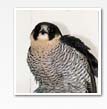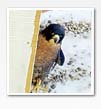About Us
Parkland Mews is a registered Canadian charity located
in Manitoba Canada. The organization was founded in 1994 and Robert
Wheeldon serves as the Executive Director.
The concept for a bird of prey organization first
materialized in July of 1994. By years end we were incorporated
and received charitable status from Revenue Canada. We also secured
a long-term management agreement with the City of Winnipeg for a
portion of a nature park on the outskirts of the city to be set-aside
for our purposes. The setting includes a dwelling for the on-site
manager.
In 1995 funding became available for a full time
staff member to manage and promote the organization. Additional
funds were obtained for hiring summer students for development of
the site. That same year Parkland Mews made it possible for an aerial
survey to be undertaken of Manitoba to assess the numbers of breeding
Peregrines in the province as part of a national Peregrine Falcon
Recovery effort. Staff also monitored young falcon chicks destined
for release at an urban site in Winnipeg.
Education forms a major part of our operation. It
became necessary to complete the very involved process of creating
new regulations under the Manitoba Wildlife Act before birds of
prey were permitted for use in flying demonstrations in the school
program. During the period between 1995 and 1998 we worked with
politicians, senior government staff and the public at large to
introduce falconry to Manitoba. Students in Manitoba are now able
to witness trained birds of prey free flying as part of the science
curriculum.
Having achieved the means to support our education
endeavors, it was equally important to maintain our conservation
efforts on behalf of the Peregrine Falcon. Therefore in 1999 Parkland
Mews set a new initiative in the form of a proposal to Manitoba
Conservation expressing our willingness to undertake a recovery
action. In January 2000 permits were issued under the Endangered
Species Act allowing Parkland Mews to hold Peregrine Falcons. That
same year we were able to raise enough money to purchase four Peregrine
Falcon chicks and build facilities in which to hold and maintain
them.
In 2001 an additional female was added to the existing
nucleus of birds for use in the breeding program. Further expansion
of the Parkland Mews resources took shape in the form of a Peregrine
Falcon release tower, which was constructed on site courtesy of
Manitoba Hydro.
This last year has been even more rewarding. In recognition
of our ability to achieve the desired results, Manitoba Conservation
requested Parkland Mews to produce both a Peregrine Falcon Recovery
Plan and a Peregrine Falcon Recovery Strategy. Manitoba Conservation
also stated the requirement that the 1999 Parkland Mews Peregrine
proposal be used as the basis of the formal recovery plan and strategy.
Final drafts of the plan and strategy were completed at the end
of 2002 and are ready for a formal printing.
The latest review concerning the status of Peregrines
across Canada indicates an increase in numbers of Peregrines in
some jurisdictions and a decrease in others. Manitoba is one such
area where the Peregrine is still in a precarious situation. The
issue is important for at least two reasons: Firstly, while the
Peregrine is showing a decline in Manitoba, there is for the first
time a recovery plan and strategy developed in a partnership between
Manitoba Conservation and Parkland Mews which details an in province
solution. This solution is based in part on the successful recovery
model employed in other jurisdictions and the specialized skills
available through the resources of Parkland Mews. Secondly, the
Peregrine Falcon has always been regarded as a rare but indigenous
nesting species within the province and as such is worth preserving
as part of Manitoba’s natural history.
Below is our brochure saved in jpeg format for you
to download or print from your own computer.
|

